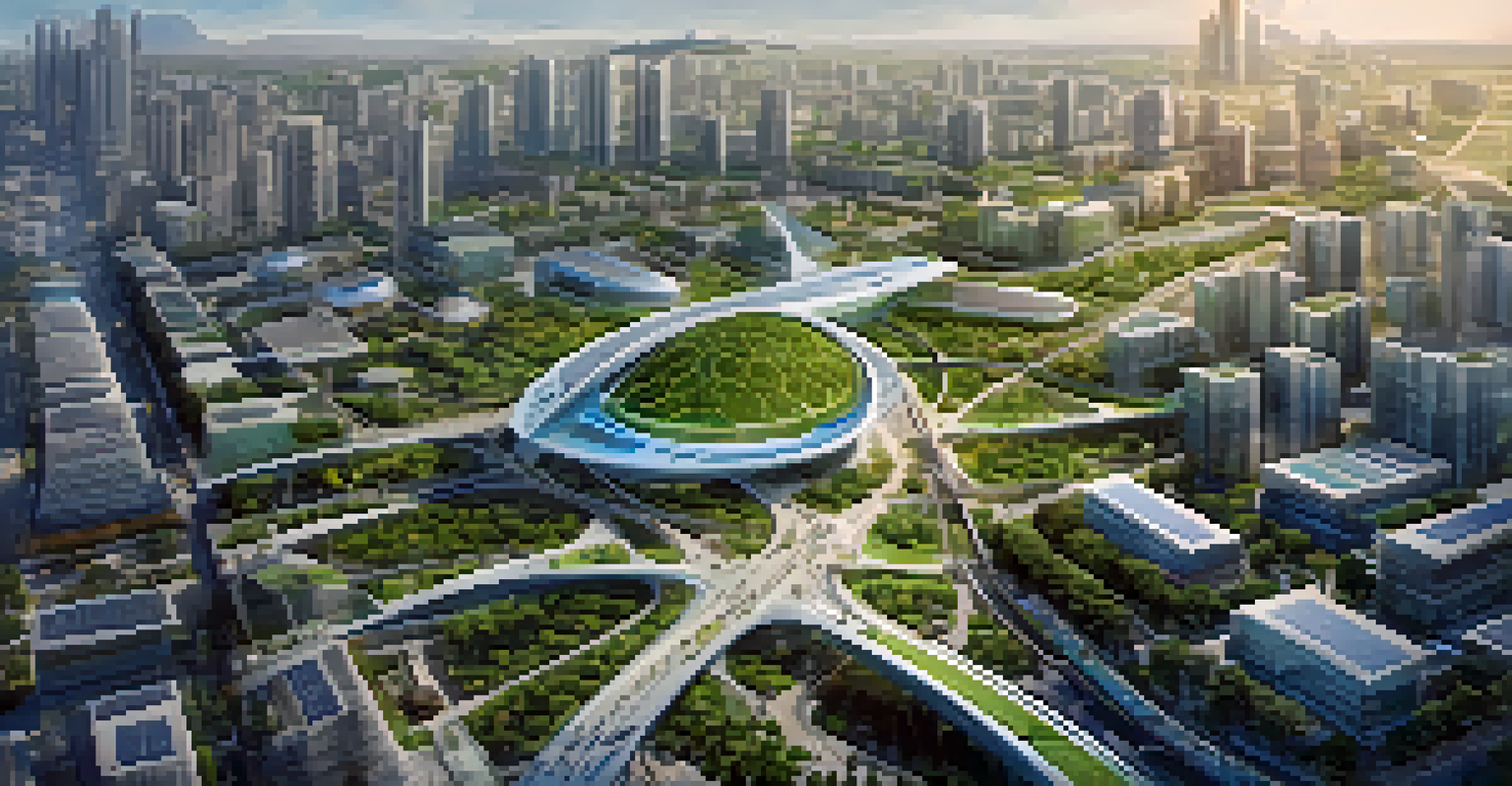The Economic Impacts of Smart City Development

Understanding Smart Cities and Their Economic Potential
Smart cities leverage technology and data to improve urban living. This concept encompasses various innovations, from intelligent transportation systems to energy-efficient buildings. By integrating these technologies, cities can operate more efficiently, attracting both residents and businesses.
The city is not a problem; the city is a solution.
The economic potential of smart cities is vast, as they can reduce operational costs for local governments and streamline services. This can lead to a more favorable business environment, prompting investments and job creation. As cities become more attractive through smart initiatives, they can also enhance the quality of life for their citizens.
Ultimately, understanding the framework of smart cities helps us appreciate their economic benefits. By investing in technology, cities can foster innovation and improve their overall economic resilience, setting the stage for sustainable growth.
Job Creation and Economic Growth in Smart Cities
One of the most significant economic impacts of smart city development is job creation. As cities invest in new technologies and infrastructure, they often find that they need a skilled workforce to implement and maintain these systems. This not only opens up new job opportunities but also attracts talent from other regions.

Furthermore, smart cities can stimulate economic growth by fostering entrepreneurship. For instance, the presence of technology hubs can encourage startups to flourish, providing residents with innovative products and services. This vibrant ecosystem can lead to a diverse economy, making cities more resilient to economic downturns.
Smart Cities Boost Economic Growth
By leveraging technology, smart cities can reduce costs, enhance services, and attract investments, leading to significant economic development.
In essence, smart city initiatives have the potential to transform local job markets and stimulate economic growth. By creating a favorable environment for businesses and talent, these cities can thrive and offer better opportunities for their residents.
Enhanced Efficiency and Cost Savings through Technology
Smart technologies improve operational efficiency for city services, leading to significant cost savings. For example, intelligent traffic management systems can reduce congestion, which not only saves time but also lowers fuel consumption. This results in lower transportation costs for both residents and businesses.
Sustainable development is the pathway to the future we want for our children and grandchildren.
Moreover, smart energy solutions, such as smart grids, help optimize energy consumption. By managing resources more effectively, cities can reduce operational expenses while promoting sustainable practices. This efficiency can also translate into lower utility bills for residents, enhancing their disposable income.
Ultimately, the financial benefits of enhanced efficiency can be reinvested in community development. Cities can allocate savings to education, healthcare, and infrastructure, thereby improving overall quality of life for their inhabitants.
Attracting Investments with Smart City Initiatives
Smart city initiatives can significantly attract investments from both domestic and international sources. Investors are often drawn to cities that demonstrate forward-thinking approaches to urban challenges. By showcasing their commitment to innovation, these cities can position themselves as attractive investment destinations.
For instance, initiatives like smart public transportation can improve accessibility and connectivity, enhancing the appeal for businesses looking to establish a presence. The result is a thriving local economy fueled by new enterprises and enhanced services.
Job Creation through Innovation
The development of smart cities not only creates new job opportunities but also encourages entrepreneurship, fostering a diverse and resilient economy.
This cycle of investment and development creates a positive feedback loop, where increased economic activity leads to further enhancements in smart city projects. As cities continue to evolve, they can become even more attractive to investors, fostering long-term economic growth.
Improving Quality of Life through Economic Development
Economic development in smart cities often translates into improved quality of life for residents. Enhanced public services, such as healthcare and education, become more accessible and efficient as cities adopt smart technologies. This can lead to healthier and more educated populations, benefiting the economy in the long run.
Moreover, smart city initiatives often focus on sustainability, helping to create cleaner and greener urban environments. This not only improves the health of residents but can also increase property values and attract new businesses, further stimulating economic growth.
By prioritizing quality of life alongside economic development, smart cities can create vibrant communities where people want to live and work. This holistic approach ultimately fosters a more engaged and productive citizenry.
Sustainable Development and Its Economic Benefits
Sustainable development is a cornerstone of smart city initiatives, balancing economic growth with environmental stewardship. By investing in green infrastructure and renewable energy sources, cities can reduce their carbon footprint while also creating new jobs in emerging sectors. This not only supports the economy but also addresses pressing environmental challenges.
The long-term economic benefits of sustainability are evident in reduced energy costs and improved public health. For instance, cities that prioritize green spaces and public transport can decrease pollution levels, leading to a healthier population. In turn, this can result in lower healthcare costs and a more productive workforce.
Sustainability Drives Long-term Benefits
Investing in sustainable practices within smart city initiatives can generate economic returns while promoting environmental health and community well-being.
Ultimately, smart cities that embrace sustainable development can generate economic returns while safeguarding the environment for future generations. This approach fosters a sense of community and responsibility, where economic and ecological considerations go hand in hand.
Challenges and Considerations in Smart City Development
While the economic impacts of smart city development are promising, there are challenges to consider. Funding these initiatives can be a significant hurdle for many cities, especially those facing budget constraints. Securing investment and public support is essential for successful implementation.
Moreover, the digital divide may exacerbate inequalities if not addressed. Ensuring that all residents have access to technology and smart services is crucial for inclusive economic growth. Cities must create strategies that promote equity and accessibility in their smart city plans.

In summary, while the benefits of smart city development are substantial, navigating these challenges requires careful planning and collaboration among stakeholders. By addressing these issues proactively, cities can maximize the positive economic impacts of their smart initiatives.
The Future of Smart Cities and Economic Resilience
The future of smart cities looks bright, with continuous advancements in technology promising to redefine urban living. As cities embrace digital transformation, they can foster economic resilience in an ever-changing global landscape. This resilience is essential in preparing for potential economic downturns and other challenges.
In particular, the integration of artificial intelligence and big data analytics can enhance decision-making processes for city management. By leveraging these tools, cities can anticipate and respond to economic shifts, improving their overall adaptability.
Ultimately, the evolution of smart cities will play a pivotal role in shaping sustainable economies. As urban areas innovate and adapt, they will not only improve the lives of their residents but also set new standards for economic development worldwide.